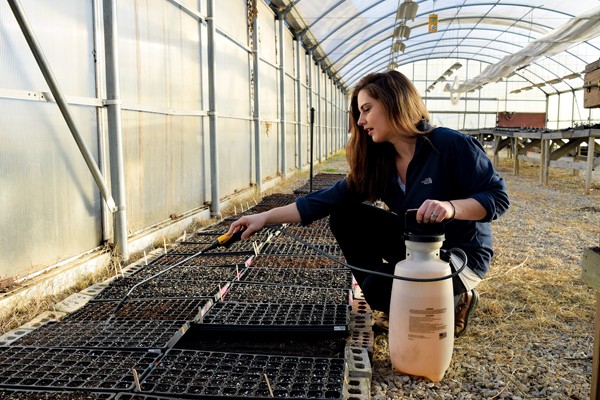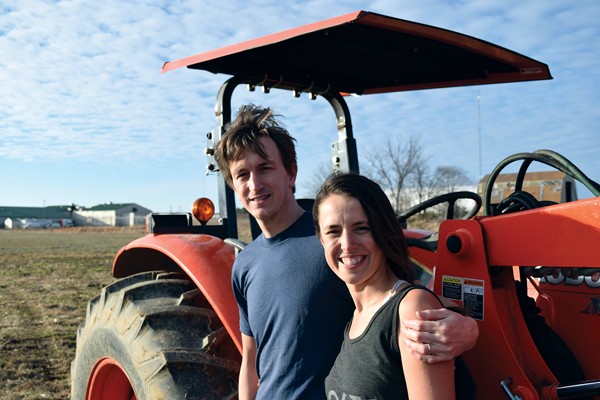Lauren Farr has a lot on her plate. This 31-year-old mother of two works full-time as a paramedic for the Memphis Fire Department — not to mention, she’s five months’ pregnant. So what does she do with her free time?
Well, obviously, she’s becoming a farmer. When I met her, she was up to her elbows in potting soil, seeding some snapdragons in a greenhouse at Shelby Farms.
 Roots Memphis Farm Academy group
Roots Memphis Farm Academy group
Lauren Farr
“It’s what I’ve always wanted,” she says, wiping a bit of dirt off her nose. “I just always figured I’d run out of money trying to figure out how to do it.”
Farr is a student at Roots Memphis Farm Academy. It’s a two-and-a-half year program that will teach her how to run a sustainable, profitable food business — everything from germinating bok choy to stopping killer aphids. But what’s even more important, says Roots co-founder Mary Riddle, is learning to balance the books.
“You’ve got to pencil a profit before you can plow a profit,” she says. “You can’t change the world if you go out of business.”
The concept is simple enough. Take two things that Memphis has in spades: empty land and available workers. Put them together, add a few seeds and some fertilizer, and what do you get? Sustainable business development, food relief for America’s hungriest city, and — maybe best of all — some darn good veggies.
“I think the best part,” says 24-year-old Taylor Edwards, “is just being outside, you know? Getting your hands dirty. There’s no one hanging over you. You’re free.”
Students spend their first six months at Roots in the classroom, learning to keep records and make financial models for every crop they grow. It’s tough stuff, and only about half the recruits who start out ultimately make it through. But the knowledge is essential, says Riddle, because a poor grasp of economics is why so many small farms fail.
 John Klyce Minervini
John Klyce Minervini
Wes and Mary Riddle
“On our first day of class,” Riddle says, “we tell them, you are an entrepreneur, and there is exactly zero separation between you and your business.
“If you want to buy a tractor in three years, you need to start working on your credit now. You need to know how much that tractor will depreciate every year.”
From the classroom, students graduate to Shelby Farms, where each is given a quarter-acre of land to farm. There they work together, sharing tools and insights, to grow food for the Roots CSA, a vegetable subscription service.
After two years, when they have demonstrated that they can run a successful business, these future farmers start working with Roots to secure access to start-up capital and land — in many cases, blighted inner-city lots. Then they’re off.
Roots has been around since August 2013, and it’s getting ready to graduate its first class of four farmers.
“Farming is hard work,” Riddle says. “When it’s 105 degrees out and the tomatoes are cracking, you still have to go out and pick them. Obviously, that’s not for everybody.”
A full ride at Roots costs $1,800. Roots is able to keep that number low because of income from its CSA, as well as a grant from an anonymous donor. They also offer financial aid on a sliding scale.
“We actually had one person pay us in $30 increments,” recalls Riddle. “That’s what she could afford, and we really wanted to work with her.”
What really got my attention was how young everybody is. In a nation where the average farmer is 57 years old, this is a group of fresh-faced 20-somethings. What gives?
“Over the last 10 years, there has been a movement of young people entering the field of farming. Which is great, because our farmers are aging, and we’ll still need to eat after they die,” Riddle says.
“I think everyone in our program has been driven to create a business that matters, a business that’s kind to the earth, a business that’s making a positive social impact. They are driven to fix a broken food system, and that’s a beautiful thing.”
Liam Boyd would agree with that. At 22, he’s one of the program’s success stories, growing huge bushels of bok choy, kale, and arugula for the Roots CSA. But for Boyd — who hails from North Memphis — learning to farm has a more personal significance.
“Where I’m from,” he says, “you’re either unemployed, working a dead-end job, or you’re doing something illegal. But I tell my friends, This is my hustle. I’m growing vegetables, and I’m making more money than all y’all.”